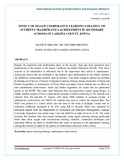Effect of Jigsaw Cooperative Learning Strategy on Students’ Mathematics Achievement in Secondary Schools in Laikipia County, Kenya
Abstract
Despite the important role mathematics plays in the society, there has been persistent poor performance in the subject in the Kenya Certificate Secondary Education (KCSE). This raises concern to all stakeholders in education due to the importance they attach to mathematics. Among the factors that are attributed to the students’ poor performance in the subject includes the ineffective instructional methods used by teachers. This study sought to address the problem by finding out if the use of Jigsaw Cooperative learning Strategy during instruction of Surds and Further Logarithms in mathematics to Form Three secondary school students has an effect on their mathematics performance. Surds and further logarithms are topics that are performed poorly in the KCSE. The study used Solomon four non-equivalent control group design. A simple random sample of four co-educational secondary schools consisting of 188 students was selected from the possible 67 schools with about 5000 students in Laikipia County. A mathematics achievement test (MAT) for students was used to collect the required data. The MAT was piloted in a school which was not used in the study in Laikipia County and its reliability coefficient estimated to be 0.95 using KR-21 formula. MAT was validated by education experts from the Department of Curriculum and Education Management, Laikipia University. Hypothesis was tested using t-test and ANOVA at alpha (ά) level of .05. The study revealed that students who were taught mathematics using Jigsaw learning strategy performed better than those taught with conventional teaching methods. Curriculum developers and education officers are likely to benefit from this study in deciding on the appropriate learning strategy for learners to improve the quality of mathematics education in the country.

